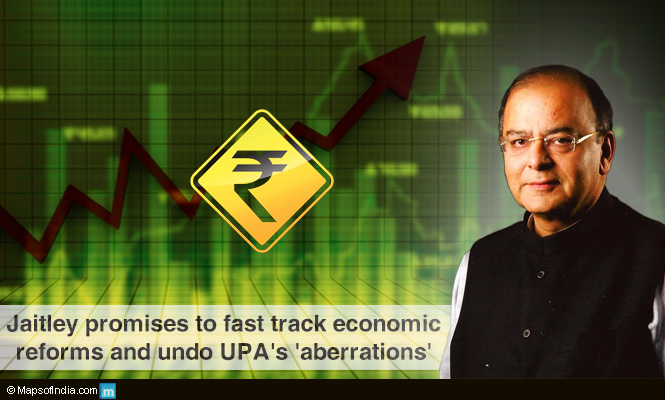Continuing the trend of breaking records, equity benchmarks recorded a new high at closing on Friday. The 30-share BSE Sensex went up 255 points to close at 28,693.99 points after having reached an all-time high of 28,822.37 points. BSE’s record breaking spree continued into market capitalisation. The exchange crossed the INR 100 lakh crore market capitalisation-mark in Friday’s intra-day session.
Not to be outdone, the CNX Nifty breached the 8,600 mark, to reach up to an all-time high of 8,617. Profit booking in the latter part of Friday’s trading session, however, resulted in the benchmark index losing steam. Nifty closed the day at 8,588.25 points, a gain of about 94.05 points. Market watchers seem buoyant about the movement of the indices and the next target of the Bull Run seems to be 29000 for the Sensex and 8,750 for the Nifty. However, experts seem to agree that a correction is likely before the next budget is announced. With inflation woes well under control, economists are now looking at the chances of a rate revision by the Reserve Bank of India on December 2 during its fifth bio-monthly monetary policy review.
BHEL, PNB, Hindalco and the DLF were the top Nifty gainers while Bharti Airtel, NMDC, Cairn, and ITC were the top losers at the index. Brent crude prices fell to the lowest levels since mid-2010 in the global markets. Not only did this fuel further speculations about an RBI rate cut, it also further propelled the stock value of BHEL, HUL and a number of other companies. Silver closed the week at 34,527 and gold at 25,794. Sentiments for the metals were largely negative.
RBI issues guidelines for payment banks and small banks
In keeping with its promise to pave the way for differentiated banking licences, the RBI finalized its guidelines and norms for small banks which will cater exclusively to small farmers and businesses and payment banks that will function in the remittances business. According to the RBI, small banks will target the finance needs of “unserved and underserved sections including small business units” and payment banks will be allowed to accept deposits from NRIs and facilitate remittances but will not be permitted to lend loans. A number of different companies shall be allowed to apply for these small bank and payment bank licences.
Growth targeted reforms to be initiated, says FM
On Saturday, Finance Minister Arun Jaitley reiterated the NDA Government’s commitment to pursue 8 percent growth for the Indian economy. As part of these efforts, the Government shall be introducing a number of economic reforms, he said. The Finance Minister assured the country that introduction of Goods and Services Tax, insurance amendment Bill, reassessment of subsidy policies, changes in the land acquisition law, and auctioning of mineral blocks (apart from coal) would be part of the Government’s primary agenda through the winter session of Parliament.
Earlier this week the Finance Minister had promised that the 2015 Union Budget shall unveil an entire set of second-generation reforms. Apart from a stable tax regime and reliable policies, the country will also need to undo major “aberrations” of the previous Government, he said. Citing the dismal state of the economy that the NDA Government had inherited and the subsequent investors’ loss of faith, Jaitley said that the Modi administration’s efforts had started to pay off. By 2015-16 he expected growth to reach about 6 percent and 8 percent in the long run.
Amazon likely to acquire Jabong
The Indian e-commerce market may soon be looking at a USD 1.2 billion acquisition – the biggest of its kind in the country. Amazon India is reportedly in the early stages of discussion to buy out Rocket Internet’s Jabong. Flipkart’s acquisition of Myntra at about USD 340 million has hitherto been the biggest e-commerce acquisition in India. Jabong is currently the largest online store catering to fashion and clothing in India and holds about 25 percent of the market share. Adding Jabong could go a long way in establishing Amazon as the e-commerce leader in India. Between January and June 2014, Jabong reported catering to over 3 million orders (gross merchandise value of INR 509 crore).
Gold import restrictions eased
This week the Government handed a substantial relief to gold importers by removing restrictions on import of the yellow metal. The restriction that had made it mandatory for importer to export 20 percent of the quantity of gold imported so as to check the current account deficit, has now been scrapped. With the easing of these restrictions the World Gold Council believes that gold exports shall start to soar once again and there shall be a sharp decline in gold imported through illegal channels.
Government to privatize railway stations
Even as he flagged off the first rail service to Meghalaya, Prime Minister Narendra Modi made a strong pitch for enhancing rail connectivity to the North East and also privatization of railway stations. Ruing that railways services were very backward in the country, Modi said, “Privatize the railway stations and modernise them…We can easily have trains running below and commercial properties above”. Apart from allowing 100 per cent foreign direct investment in the railways, the NDA Government has solicited cooperation from Japan, Singapore and China in its efforts to completely modernize the rail network and introduce high-speed trains in the country.






